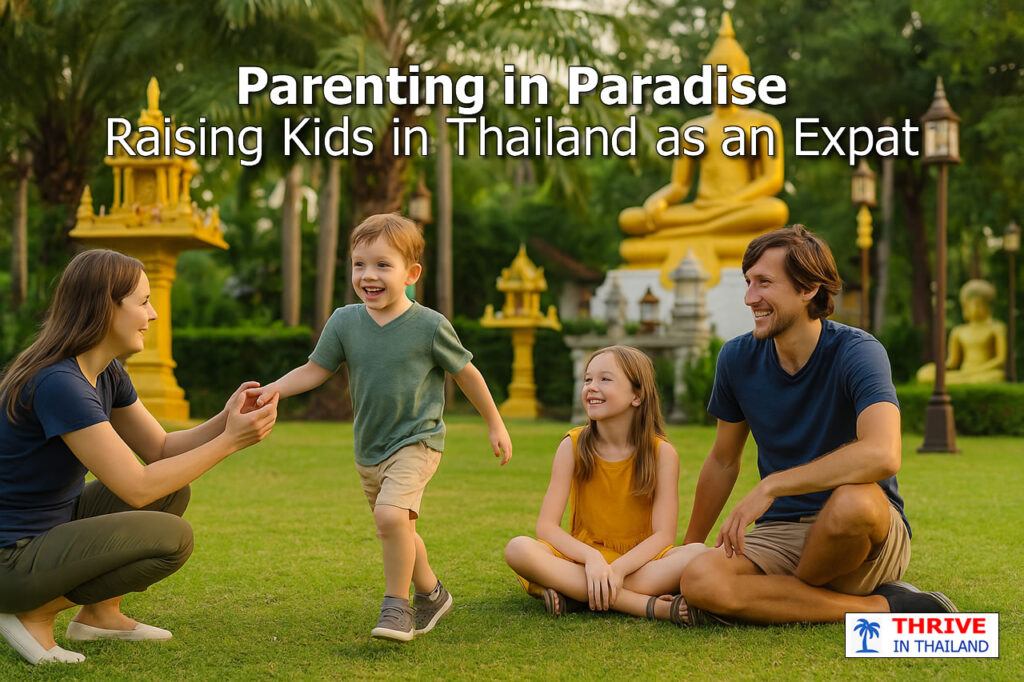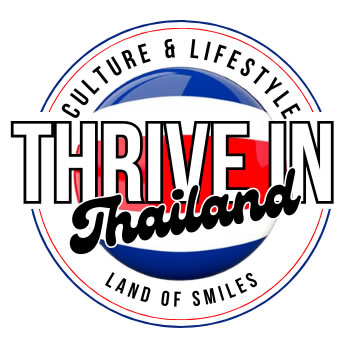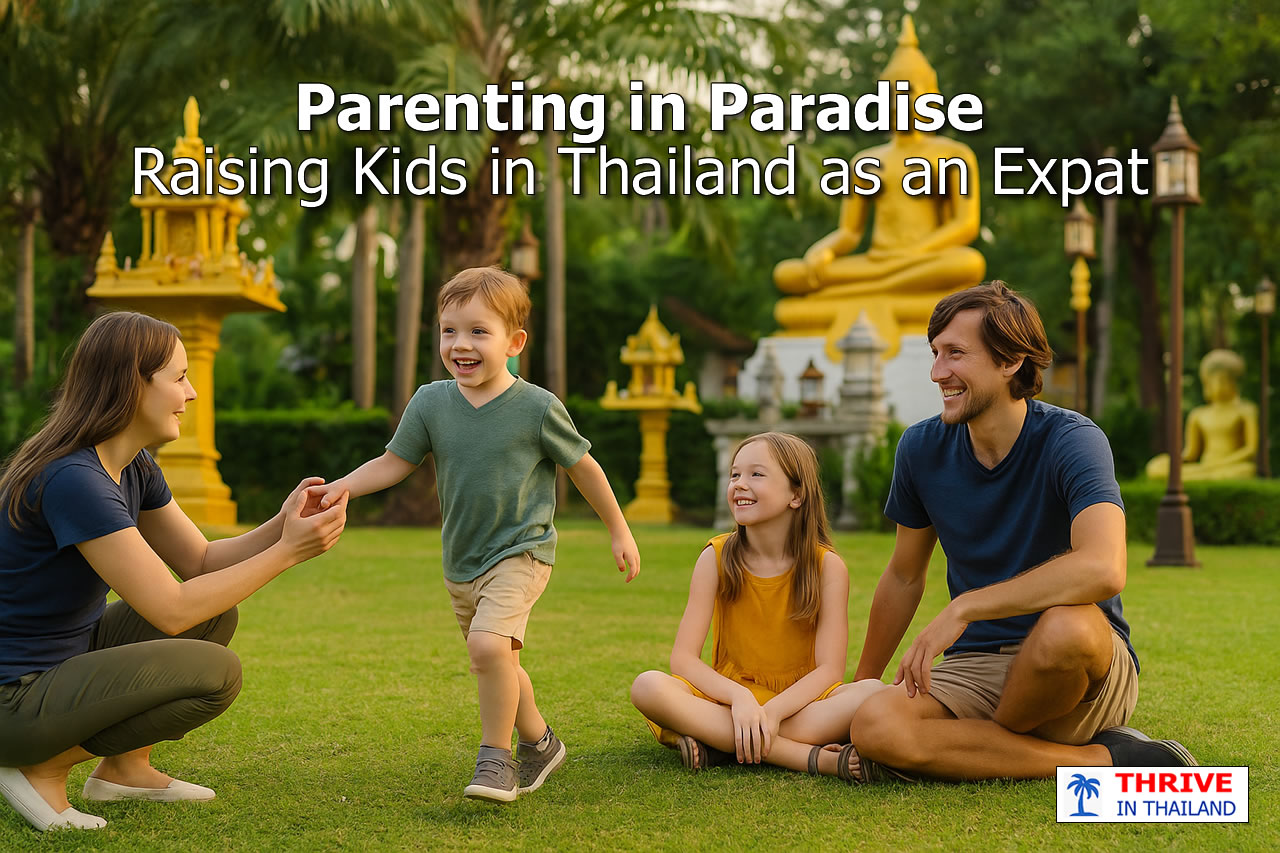
Raising a family in Thailand comes with plenty of rewards—but also a fair share of challenges. As an expat parent, you’ll need to make decisions about education, healthcare, language, and how best to integrate into a culture that may be very different from what you’re used to.
The good news is that Thailand offers a lot for families. International schools are widely available, healthcare is affordable and reliable, and many communities are safe and welcoming. Daily life is often simpler, and the cost of raising children is typically lower than in Western countries.
That said, raising kids in another country means adapting—not just to a new system, but to new expectations. From understanding Thai values around parenting to navigating school enrollment or finding childcare, it’s important to go in informed.
This guide covers everything you need to know to raise a family in Thailand as a foreigner, whether you’re already here or planning the move.
Education Options for Expat Kids
One of the biggest decisions for expat parents in Thailand is choosing the right school. Fortunately, Thailand offers a wide range of education options, especially in major cities like Bangkok, Chiang Mai, Phuket, and Pattaya. Your choice will depend on your child’s age, language ability, long-term plans, and of course, your budget.
International Schools
International schools are the go-to option for many expat families in Thailand. These schools typically follow well-known curricula such as the British, American, IB (International Baccalaureate), or Australian systems. Instruction is usually in English, with many schools offering strong language support, modern facilities, and a wide range of extracurriculars.
You’ll find the highest concentration of international schools in:
- Bangkok – dozens of options including top-tier institutions like NIST, ISB, and Bangkok Patana
- Chiang Mai – respected choices like Prem Tinsulanonda International School and Lanna International
- Phuket – schools like British International School Phuket (BISP) and HeadStart International
- Pattaya, Hua Hin, and Khon Kaen also have a handful of international schools serving regional expat families.
International School Tuition by Tier
Tuition fees can vary dramatically depending on the school’s location, reputation, and curriculum. Here’s a general overview to help you plan your budget.
| Tier | Approx. Cost (THB/year) | Description |
|---|---|---|
| Entry-Level | 150,000–300,000 | Smaller schools, fewer facilities, often outside big cities |
| Mid-Range | 300,000–700,000 | Good reputation, international staff, bilingual options |
| Premium | 700,000–1,000,000+ | Top-tier campuses with global accreditation and university placement support |
📌 What to Expect:
- Admissions: Many schools require early applications—sometimes a year in advance. Entry assessments or interviews are common.
- Fees Beyond Tuition: Don’t forget to budget for uniforms, transportation, meals, enrollment fees, and occasional building fund contributions.
- Waiting Lists: Especially in Bangkok, popular schools often have limited availability—early planning is key.
Here’s the full guide: International Schools in Thailand
Bilingual and Thai Private Schools
An alternative to full international schools is a bilingual school or a Thai private school with an international program. These schools blend Thai and English instruction—often with Thai teachers for core subjects and native English speakers for language support.
They’re typically more affordable than international schools and can be a great option for families who want their kids to integrate more deeply into Thai culture, especially if you plan to stay long-term.
Where You’ll Find Them:
- Found in most major cities—especially Bangkok, Chiang Mai, Phuket, Pattaya, and Udon Thani
- Many are affiliated with Buddhist foundations or Thai educational trusts
Tuition Range (Annual):
| Tier | Approx. Cost (THB/year) | Description |
|---|---|---|
| Entry-Level | 50,000–100,000 | Primarily Thai-led schools with basic English instruction |
| Mid-Range | 100,000–300,000 | More balanced Thai-English programs, better facilities |
| Premium | 300,000–500,000 | Hybrid models with strong English support and modern infrastructure |
What to Know:
- Pros: Encourages Thai fluency, builds cultural roots, fosters long-term integration
- Cons: English language support and teaching methods can vary—best to visit and ask other parents
- Learning Style: Thai schools often emphasize rote memorization and respect for hierarchy, which may differ from Western approaches
Thai Public Schools (Rarely Chosen by Expats)
Enrolling in a Thai public school is technically possible, but it’s rarely the preferred route for expat families. These schools operate entirely in Thai, with large class sizes and a focus on rote learning. Unless your child is already fluent in Thai and well-adjusted to the local culture, they may struggle socially and academically.
That said, for mixed-nationality families living in rural areas or those seeking full cultural immersion, it can be a deeply rewarding—if challenging—choice.
Homeschooling and Online Learning
While not mainstream, homeschooling and online education are viable options for expat families—especially in rural areas or for those who travel frequently. Homeschooling is legally allowed in Thailand, though it requires registration with the Ministry of Education for Thai citizens. For foreign nationals, the process is less rigid, though still worth understanding.
📌 Good to Know:
- Registration: Required for Thai children; expat families often operate with more informal oversight.
- Flexibility: Online platforms (like international virtual schools or hybrid programs) offer structure without location limits.
- Support Matters: A strong parent network and consistent routine are key to making it work long term.
This option suits families with specific educational philosophies, lifestyle needs, or those in areas with limited school access.
Popular Online Schooling Options for Expat Families
Accredited international platforms suitable for homeschooling or flexible learning in Thailand.
| Platform | Curriculum | Notes |
|---|---|---|
| Wolsey Hall Oxford | British (IGCSE, A-Level) | Established UK-based homeschool provider with flexible pacing. |
| iCademy Middle East | American (K–12) | Accredited U.S. curriculum with live online instruction and teacher support. |
| Laurel Springs School | American (College Prep) | Offers personalized learning paths; ideal for frequent travelers. |
| InterHigh | British (KS3–A-Level) | Live UK curriculum lessons with strong presence in Asia. |
| International Connections Academy | American (K–12) | Part of Pearson Education; widely recognized and accredited. |
📌 Note: These programs typically require tuition fees and stable internet. Some also offer AP, IGCSE, or A-Level exam prep.
Childcare and Early Learning (Ages 0–5)
If you’re moving to Thailand with toddlers or planning to start a family here, childcare is one of the first things you’ll need to consider. The good news is that Thailand offers a variety of early learning options—and compared to many Western countries, it’s often far more affordable.
Daycares and Preschools in Thailand
Daycare centers and preschools (อนุบาล, anuban) are widely available in cities and expat-friendly areas. Options range from small neighborhood facilities to high-end international preschools offering English-based curriculums.
Programs typically start at age 2 or 3, with a focus on socialization, structured play, and basic early learning. Many international preschools follow well-known approaches like Montessori, Reggio Emilia, or the British EYFS (Early Years Foundation Stage).
📌 Thai-language government preschools are an option, but most expat families prefer private or international settings with bilingual or English instruction.
What to Look for When Choosing a Preschool
When visiting a daycare or preschool, pay attention to:
- Clean and safe facilities (especially bathrooms and play areas)
- Teacher-to-child ratio (ideally no more than 1:5–1:8 for toddlers)
- Language of instruction and how staff interact with children
- Daily schedule: nap time, snacks, hygiene routines
- Outdoor space, learning materials, and parent communication
Some schools also require entrance assessments or interviews, even at the preschool level.
Popular Locations with Good Options
Preschools are most concentrated in areas with large expat communities:
- Bangkok – Wide variety from budget-friendly to elite international campuses
- Chiang Mai – Several bilingual and Montessori-style options
- Phuket & Pattaya – Good mix of mid-range and international programs
- Hua Hin & Koh Samui – Fewer, but growing in number due to family expat growth
Cost Overview
Prices vary based on curriculum, location, and facilities:
| Type | Monthly Fee (THB) |
|---|---|
| Basic Thai Preschool | 3,000–5,000 |
| Mid-Range Bilingual | 6,000–15,000 |
| International Preschool | 20,000+ |
Some schools may offer half-day options, discounts for siblings, or additional charges for transportation, uniforms, and meals.
Hiring a Nanny or Domestic Helper
Many expat families in Thailand hire a full-time or part-time nanny. It’s common and socially accepted, and wages are lower than what you’d expect in the West.
- A full-time live-in nanny may cost between 12,000–18,000 THB/month, plus food and accommodation.
- A live-out or part-time helper typically earns 5,000–10,000 THB/month.
- Most nannies speak Thai, and some basic English. English-speaking or trained nannies are harder to find and may charge more.
Many families also hire domestic helpers who assist with both childcare and household duties. References and a clear agreement on responsibilities are key to a good arrangement.
Early Language Exposure
If your child is still very young, they’ll likely pick up Thai (or English) naturally depending on their environment. Preschools and Thai-speaking nannies can speed up language development, especially in mixed-language households.
That said, some expat parents find their kids struggling with English if they’re immersed in Thai-only settings early on. Others intentionally encourage bilingualism from the start by mixing home and outside environments.

Healthcare for Children
Thailand’s healthcare system is well-regarded in the region, and expat families generally have access to high-quality medical care – especially in major cities. Whether you’re visiting a pediatrician for a routine check-up or dealing with a more serious issue, it’s important to understand how the system works for children.
Pediatric Care
Thailand offers reliable and affordable healthcare for children, especially through private hospitals in major cities. Most large facilities have dedicated pediatric departments with English-speaking doctors and nurses, making them a popular choice among expat families.
Top hospitals with strong pediatric reputations include:
- Bangkok Hospital
- Samitivej Hospital
- Bumrungrad International Hospital
- Bangkok Christian Hospital
These hospitals are widely trusted by expats, especially in Bangkok, Chiang Mai, Pattaya, and Phuket.
What to Expect
- No referral needed – You can usually book directly with pediatricians, either online or by phone.
- Short wait times – Especially at private hospitals, same-day or next-day appointments are common.
- Vaccination support – Many hospitals follow CDC- or WHO-aligned immunization schedules, with plans tailored for international children.
- Child-friendly settings – Waiting areas often include play corners and toys to reduce anxiety.
📌 Tip: While government hospitals also offer pediatric care, they can be crowded and Thai-speaking only. For peace of mind and convenience, most expats choose private facilities despite higher costs.
Vaccinations and Preventive Care
Vaccinations are widely accessible in Thailand, offered through both public hospitals and private clinics. The Thai immunization schedule is issued by the Ministry of Public Health and mostly aligns with WHO and Western guidelines.
For expat families, private hospitals often offer convenient vaccine packages, clearly labeled in English and managed by pediatric departments.
What Parents Should Know
- Bring your child’s immunization record when relocating—it helps Thai doctors align their schedule with what your child has already received.
- Private hospitals are often preferred for vaccinations due to clearer communication, shorter waits, and package deals.
- Some expats opt for additional vaccines, such as:
- Influenza (yearly)
- Hepatitis A (not always on Thai schedule)
- Meningococcal (especially before international travel)
- Rotavirus or Chickenpox (varicella), depending on country of origin
📌 Tip: Ask the pediatrician to explain the Thai vaccination timeline in detail. Some schools (especially international ones) may require certain immunizations not listed in the standard Thai schedule.
Emergency Care and Specialists
In urgent situations, Thailand has reliable emergency medical services for children, especially in larger cities. That said, response times and availability can vary based on your location—another reason many expats favor private hospitals for peace of mind.
What You Should Know
- Private hospitals like Samitivej, Bangkok Hospital, and Bumrungrad offer 24/7 pediatric emergency services with English-speaking staff.
- Public hospital ERs exist nationwide but may involve longer waits and Thai-only communication.
- Specialist pediatric care (e.g., speech therapy, developmental assessments, child psychiatry) is generally concentrated in Bangkok or a few large regional centers like Chiang Mai or Phuket.
- Ambulance services are available, but calling the hospital directly often gets faster results than dialing 1669 (the national emergency line).
- Insurance is strongly advised—emergency treatment at private hospitals can cost tens of thousands of baht without coverage.
📌 Tip: Save the direct emergency numbers of nearby hospitals in your phone and keep a printed list at home – especially if you live outside a major metro area.
Health Insurance for Kids
While Thailand’s healthcare is relatively affordable, having insurance for your child is absolutely essential – especially if they’re enrolled in an international school (many require proof of coverage).
Parents can choose between local Thai insurance providers or international expat-focused plans, depending on their budget and healthcare expectations.
Options to Consider
- Local Thai insurance plans
Affordable and widely available, but coverage limits can be lower and customer support may be in Thai. Best suited for families comfortable navigating local systems.
- International insurance providers
These offer broader coverage, including overseas treatment, direct billing, and English-language support—but usually come at a higher cost.
Comparison of Popular Health Insurance Providers for Expat Families
Explore trusted local and international options to protect your child’s health while living in Thailand.
| Provider | Type | Notable Features |
|---|---|---|
| Luma Health | Local/Regional | English support, Thai hospital networks |
| Pacific Cross | Local/Regional | Customizable plans, long expat track record |
| Cigna Global | International | Global coverage, tailored expat plans |
| Aetna International | International | Comprehensive coverage, direct billing options |
📌 Tip: If you’re planning to stay long-term, consider a plan that grows with your child—some providers offer add-ons for dental, vision, or mental health services.
Get practical guidance and compare trusted providers in my full Thailand Health Insurance Guide — especially helpful for families, parents, and long-term expats.
Daily Life and Family Routine
Day-to-day life as a parent in Thailand can be quite different from what you might be used to – but in many ways, it’s simpler. The slower pace, warm climate, and emphasis on family-friendly values create an environment where children are generally welcomed and well looked after.
Family-Friendly Neighborhoods
In larger cities, certain areas are particularly popular with expat families due to their access to international schools, green space, and modern amenities.
- Bangkok: Sukhumvit (especially Thonglor, Phrom Phong, and Ekkamai) is home to many international schools, playgrounds, and malls.
- Chiang Mai: Nimmanhaemin and the Hang Dong area are favorites for families.
- Phuket and Hua Hin also have family-oriented residential developments with pools, playgrounds, and security.
Most condos and gated communities offer shared facilities like swimming pools and play areas, making it easy for kids to meet others and for parents to socialize.
Transport and Getting Around
Getting kids around in Thailand depends a lot on where you live.
- In Bangkok, many families rely on a mix of BTS/MRT, private cars with drivers, or Grab.
- In smaller cities, most families drive themselves or use scooters for short trips (though not ideal for young children).
- School buses are often included in international school tuition or available for an extra fee.
📌 In some neighborhoods, parents arrange daily drop-offs and pick-ups with local taxis or songthaews, which often operate informal school routes for children in the area.
Routine and School Schedules
The typical school day at international schools runs from about 8:00 AM to 3:00 PM, with after-school activities available until late afternoon.
- Lunch is usually provided by the school or brought from home.
- Thai schools may start earlier and include more structured routines.
- Playdates are common, often arranged through parent networks or WhatsApp groups.
Domestic help—whether part-time or live-in—can make it easier for parents to manage routines, especially in households with two working parents.
Community Life
Thailand is generally very child-friendly. Strangers often smile at or play with your child in public, and you’ll rarely feel judged for the occasional tantrum.
- Many malls, restaurants, and cafes have kid’s areas or play zones.
- Local temples and public parks are popular weekend spots for families.
- It’s easy to find other expat or mixed families through schools, Facebook groups, or local events.

Cost of Raising a Child in Thailand
One of the reasons many expat families choose to live in Thailand is the overall lower cost of living – especially when compared to Western countries. But while raising children in Thailand can be more affordable, costs vary widely depending on your choices around schooling, healthcare, and lifestyle.
Monthly Child-Related Expenses (Approximate)
Here’s a general idea of what you might expect to spend per child each month:
| Category | Lower Range (THB) | Mid-Range (THB) | Upper Range (THB) |
|---|---|---|---|
| International School | 15,000 | 50,000 | 100,000+ |
| Preschool/Daycare | 3,000 | 12,000 | 25,000 |
| Nanny (full-time) | 12,000 | 15,000 | 20,000 |
| Healthcare/Insurance | 1,500 | 3,000 | 5,000+ |
| Food & Essentials | 3,000 | 6,000 | 10,000 |
| Activities/Toys | 2,000 | 4,000 | 8,000 |
| Transportation | 1,500 | 3,000 | 5,000 |
| Total (Estimated Range) | 38,000 | 93,000 | 173,000+ |
📌 Note: All amounts are estimated monthly costs per child in Thai Baht (THB). School fees and living expenses vary significantly based on location and type of institution—Bangkok and tourist areas tend to be pricier, while smaller cities are more budget-friendly.
Schooling Is the Biggest Variable
For families choosing international schools, tuition will likely be the largest expense. Some schools require upfront fees, enrollment deposits, and annual development fees—so it’s important to budget beyond just monthly tuition.
- Expect to pay 200,000–800,000 THB/year at most mid-range international schools.
- Top-tier schools can exceed 1 million THB/year.
Bilingual and Thai private schools offer a more budget-friendly option, often under 100,000 THB/year.
Healthcare and Insurance
Routine pediatric care is affordable, but it’s wise to have a good insurance plan—especially for emergencies or hospitalizations. Many international plans offer family packages, while local insurers like Pacific Cross or Luma provide child-specific plans.
Everyday Savings
Compared to the West, items like diapers, baby clothes, formula, and food are relatively affordable – especially if you stick with local brands. Imported goods, however, can be expensive.
Hiring help (e.g., nanny, housekeeper) is also significantly cheaper than in Europe or North America, making it easier for both parents to work or enjoy more flexibility at home.
Make sure you’re financially prepared—read my full guide to Banking & Financial Tips for Expats in Thailand to set up your accounts, manage transfers, and avoid common money traps.
Cultural Norms and Integration
Parenting in Thailand means navigating a different set of social expectations and cultural values. Thai culture tends to be warm and affectionate toward children, but the approach to discipline, education, and family roles may differ from what many expat parents are used to.
How Thai Society Views Children
Children in Thailand are generally welcomed in most public spaces, and strangers often engage warmly with them – whether offering a smile, playing peek-a-boo, or even handing out small gifts.
- There’s a strong emphasis on “sanuk” (fun), so play and laughter are seen as important parts of childhood.
- Kids are often allowed to be noisy or messy in public without harsh judgment.
- However, respect for elders and modest behavior are also instilled from a young age.
Parenting Styles: Thai vs. Western
Thai parenting traditionally leans more toward obedience and respect for hierarchy. While this is changing in modern families, you may notice differences in:
- Discipline: Thai parents may use shame or indirect correction rather than direct confrontation.
- School Pressure: Academic success is highly valued, and rote learning is still common in many Thai schools.
- Community over Individualism: Children are often taught to think about how their actions affect the group, not just themselves.
Expat families sometimes struggle with these contrasts – especially if their child attends a Thai or bilingual school where cultural expectations are more rigid.
Integrating as a Mixed or Foreign Family
Children of mixed heritage or foreign background are usually treated with curiosity and kindness. In many communities, they’re affectionately referred to as “luk khrueng” (half-children), and this often carries a positive social cachet.
- Integration tends to be easier for children than adults—especially when they attend Thai schools or speak the language.
- Parents may need to help bridge cultural misunderstandings at home, especially when balancing Western and Thai parenting approaches.
- Joining family-oriented communities, schools, or interest groups can ease the transition.
Values, Religion, and Moral Education
In Thailand, moral education is closely tied to Buddhist teachings and cultural values. While most international schools offer secular instruction, religion still plays a subtle but important role in everyday life – especially in Thai schools or community settings. As an expat parent, it’s helpful to understand how these values may influence your child’s development.
Buddhism in Daily Life
Although Thailand is officially a Buddhist country, the approach to religion in schools and public life is usually non-proselytizing and focused more on values than doctrine.
- Schoolchildren—regardless of religion—often participate in Wai Khru Day (Teacher Appreciation) and visit temples on Buddhist holidays.
- Meditation, merit-making (doing good deeds), and showing respect to monks are common parts of school activities in Thai schools.
- These practices are generally optional for non-Buddhist students, but polite participation is appreciated and encouraged.
Core Thai Values Passed to Children
Whether your child attends a Thai school or simply interacts with Thai society, certain cultural values are emphasized early on:
- Respect for elders and authority
- Humility and politeness
- Avoidance of confrontation or “losing face”
- Gratitude and duty to family
These values may differ from Western norms that prioritize assertiveness and independence, but many expat parents find that they complement, rather than conflict with, their own principles – especially when approached with openness.
How to Navigate as a Foreign Family
- If your child is enrolled in a Thai or bilingual school, take time to learn about the school’s approach to religious and moral education.
- For international schools, values education may be taught through global citizenship or character-building programs instead of religious studies.
- It’s okay to ask about the role of religion in the curriculum—most schools are respectful of cultural and religious differences.
📌 Some expat parents choose to supplement with their own traditions at home, creating a balanced environment that respects both Thai and home-country values.

Language Development: Thai, English, and Multilingualism
Raising children in a multilingual environment can be both a gift and a challenge. In Thailand, your child may be exposed to Thai, English, and possibly other languages depending on your household and school choices. Understanding how children pick up languages in this environment—and how to support them—is key for long-term integration and academic success.
When Kids Learn Thai (and When They Don’t)
Children are naturally good at picking up new languages, especially in the early years. If your child is in a Thai school, has a Thai nanny, or plays with local kids regularly, they may develop Thai fluency without much effort.
- Preschool age (2–5) is ideal for language absorption.
- Children in international schools may not pick up much Thai unless it’s spoken at home or reinforced outside the classroom.
- On the flip side, kids in Thai or bilingual schools often become fluent in Thai but may lag in English if it’s not maintained at home.
Supporting Multilingual Development
Many expat families aim for bilingualism or even trilingualism, depending on the parents’ native languages. A few tips:
- Be consistent at home: Use one language per parent (often called the “one parent, one language” method).
- Don’t worry if your child mixes languages at first—this is a natural part of multilingual development.
- Make learning fun: songs, cartoons, and storybooks in multiple languages help reinforce vocabulary.
If needed, consider language tutors, online courses, or Thai classes outside of school—especially if your child needs extra support in either Thai or English.
Should Parents Learn Thai Too?
While not essential, learning Thai alongside your child can make a big difference. It not only helps with communication but also shows cultural respect and sets a good example.
- Many schools offer beginner Thai lessons for foreign parents.
- Being able to speak with teachers, neighbors, and other parents—at least on a basic level—goes a long way toward integration.
Activities and Entertainment
Thailand is a very family-friendly country, and keeping your kids entertained – whether after school or on weekends – is rarely a problem. From indoor play zones and sports clubs to nature outings and cultural events, there’s no shortage of things to do for children of all ages.
Everyday Activities
Most cities have a wide range of activities for kids, many of which are affordable and easy to access.
- Indoor play centers are popular, especially in malls. Places like Funarium (Bangkok), Kidzoona, and HarborLand have safe, supervised environments for all ages.
- Parks and public playgrounds vary in quality but are improving—look for newer parks in family-oriented neighborhoods.
- Swimming pools are common in condos, but many communities also have swim schools and lessons.
After-School Programs and Hobbies
International schools and local clubs offer a wide range of extracurriculars:
- Sports: football, swimming, Muay Thai, tennis, gymnastics
- Arts: painting, drama, music (piano, guitar, etc.)
- STEM & language: robotics, coding, Mandarin, extra Thai lessons
📌 Many activities are available in both Thai and English, and it’s common for kids to join multiple programs during the week.
Weekend Getaways and Day Trips
Thailand’s geography offers plenty of options for short family getaways:
- Beaches (Hua Hin, Koh Samet, Phuket) for weekend fun
- National parks for hiking and waterfalls
- Cultural trips to temples, museums, or elephant sanctuaries (check for ethical operations)
📌 Short trips can be a great way to balance urban life with nature and give your kids a deeper appreciation of Thai culture and the outdoors.
Cafés and Restaurants with Kid Zones
Many restaurants and cafes now cater to families with dedicated kids’ areas, play corners, or even petting zoos. These are especially common in Chiang Mai and Bangkok and make outings much easier for parents who want to relax while the kids are entertained.
Legal & Bureaucratic Considerations
When raising children in Thailand as a foreigner, there are a few important legal and administrative matters to be aware of. These include birth registration, visas, school documents, and health records. Handling them correctly helps ensure a smoother experience for your family – both now and in the future.
Birth Registration and Nationality
If your child is born in Thailand, you’ll need to register the birth with both Thai authorities and your home country’s embassy.
- Thai birth certificates are issued at the local district office (amphur) – usually within a week of birth.
- Children born in Thailand do not automatically receive Thai citizenship unless one parent is a Thai national.
- For foreign parents, the child’s nationality follows the rules of your home country, so embassy registration is essential.
Visas for Children
Foreign children living in Thailand need the appropriate visa just like adults. Common options include:
- Dependent Visa (Non-O or under guardian) – if one parent holds a valid long-stay visa (e.g., retirement, marriage, LTR).
- Education Visa (ED) – for school-aged children enrolled in qualifying institutions.
- Thai Citizenship or Permanent Residency – rare for foreign children but possible in some mixed-nationality families.
📌 If both parents are on temporary visas (e.g., Tourist or Non-B), it’s important to ensure your child’s visa status aligns with yours to avoid overstay penalties.
Vaccination and Medical Records
Thailand requires immunization records for school enrollment—especially for Thai and bilingual programs.
- Private hospitals issue vaccination booklets in English and Thai.
- Some schools require a doctor’s certificate confirming health and up-to-date vaccinations.
Tip: Always keep digital copies of your child’s medical and visa records.
School Enrollment Documents
When enrolling in a school – especially private or international ones—you’ll usually need:
- Child’s passport and visa
- Birth certificate (translated if not in English/Thai)
- Previous school records or transcripts (if applicable)
- Medical and vaccination documents
📌 It’s worth checking each school’s requirements early, as processing time and document legalization may be needed.
Thinking ahead can save you a lot of stress—especially when moving abroad with children. Here’s a quick checklist of what to take care of before & after arriving in Thailand as a parent.
| Checklist Item | Timing |
|---|---|
| Research schools and request records | Before Arrival |
| Prepare birth certificate & vaccination documents | Before Arrival |
| Plan your child’s visa (dependent, guardian, or ED) | Before Arrival |
| Find family-friendly neighborhoods & hospitals | Before Arrival |
| Enroll child in school or daycare | After Arrival |
| Register visa and submit school documents | After Arrival |
| Choose a pediatrician and health insurance plan | After Arrival |
| Connect with local parent groups or networks | After Arrival |
✅ Need a bit more structure?
Grab the complete PDF version of the Parenting in Thailand – Family Prep Checklist, including helpful extras not shown in the table above.
Returning or Relocating: Transitioning Kids In and Out of Thailand
While some families settle long-term in Thailand, others may eventually return home or move on to a new country. For children, these transitions can be significant – especially if they’ve spent their formative years in Thailand. It’s worth preparing both practically and emotionally for what’s ahead.
Repatriation Challenges
Children who grow up in Thailand often identify strongly with the local lifestyle – even if they don’t speak Thai fluently. Leaving can lead to culture shock, even when returning to their passport country.
- Reverse culture shock is common. Things that feel “normal” to you may feel foreign to your child.
- Children may miss the warmth of Thai society, their school friends, or extended family connections here.
- Academically, they might need help adjusting to different teaching styles or curriculum standards abroad.
School Transitions
If you plan to move countries mid-education, it helps to choose a school in Thailand that offers an internationally recognized curriculum (e.g., IB, British GCSE/A-levels, AP) to ease the transfer.
- Keep copies of report cards, recommendation letters, and assessment results.
- Make sure the receiving school understands the structure of the previous curriculum.
📌 Some families choose homeschooling or online education during the transition period to create more flexibility.
Maintaining Connections to Thailand
Even after leaving, many families find it meaningful to maintain ties to Thailand – especially if your child feels a strong bond with the country.
- Keep in touch with friends or former teachers.
- Celebrate Thai holidays at home or within your local Thai community (if available).
- Consider return visits to keep the connection alive.
Social Life for Parents
Raising children abroad isn’t just about your kids – it’s also about building a life for yourself. Having a supportive network makes a big difference, and fortunately, Thailand offers plenty of ways for expat parents to connect. Still, finding your community takes a bit of effort, especially if you’re not naturally outgoing or if language is a barrier.
Parent Networks and Support Groups
Most international schools and some bilingual schools have active parent associations or WhatsApp groups where you can connect, share resources, and plan playdates.
- Facebook groups are another major hub—look for city-specific ones like “Bangkok Moms & Dads” or “Chiang Mai Parents Network.”
- Many parents form friendships simply by chatting during school pickups or at after-school activities.
📌 These networks are invaluable for everything from babysitter referrals to emotional support when parenting abroad gets tough.
Making Friends Beyond the School Gate
If your child is younger or not yet in school, social opportunities may be less obvious—but still available:
- Attend baby and toddler classes at local play centers or cafes with child-friendly areas.
- Join expat clubs or family events organized by embassies or international organizations.
- Some yoga studios, community centers, and coworking spaces also offer family-focused events or informal meetups.
Cultural & Language Barriers
While Thai society is very welcoming, socializing across cultures sometimes takes time—especially if you don’t speak Thai. Making friends with local parents can be incredibly rewarding, but it may require more patience and initiative.
- Learn basic Thai greetings and phrases—it helps break the ice.
- Be open to different styles of parenting and family life.
- Don’t be discouraged if connections take time to build.
Frequently Asked Questions About Raising Kids in Thailand
1. Do I need a special visa for my child to attend school in Thailand?
Yes. If you’re on a long-term visa, your child will likely need a Guardian Visa or a dependent visa tied to yours. International schools often assist with the process.
2. How do school holidays in Thailand compare to Western school calendars?
Thai school calendars often differ. Many international schools follow Western calendars (Aug–June), while Thai and bilingual schools may operate on a May–March schedule with a long break in April.
3. Can my child join extracurricular activities or sports teams in Thailand?
Yes. Most international and many bilingual schools offer a wide range of extracurriculars—sports, music, robotics, language clubs, and more. Community centers and private programs also provide options.
4. Will my child learn Thai in school?
That depends on the school. Thai language is usually mandatory in Thai and bilingual schools. At international schools, it’s often optional or limited to a few hours per week.
5. Can my child continue their education abroad after studying in Thailand?
Yes. Most international schools follow globally recognized curricula (British, IB, American, etc.) that support smooth transitions to overseas schools and universities.
6. How easy is it to switch schools if something doesn’t work out?
Changing schools is possible, though mid-year transfers can be tricky due to waitlists or curriculum differences. It’s best to plan ahead and check each school’s admission policies.
Real Stories from Expat Parents
No two families experience life in Thailand the same way. While some adapt quickly, others face unexpected challenges – or discover unexpected joys. Hearing how other expat parents have navigated raising kids here can offer both reassurance and perspective.
“We Came for a Year… and Stayed for Ten”
“Our plan was to try a one-year teaching contract in Chiang Mai and then return home. That was eight years ago. The school community welcomed us, our two kids thrived at a local bilingual program, and we slowly built a lifestyle that felt more balanced than what we had back in the UK.”
Sarah, teacher & mother of two
“International School Was a Stretch – But Worth It”
“The tuition fees were a shock at first, but the quality of education, small class sizes, and focus on creativity made it worthwhile. Our son now speaks Thai and English fluently, and we’ve met families from all over the world.”
Jason, IT consultant in Bangkok
“Blending Cultures at Home”
“My husband is Thai, I’m from Germany, and our daughter was born here. We speak three languages at home. It’s not always smooth (especially when it comes to discipline) but raising her here has helped us both understand and respect each other’s culture more deeply.”
Anna, long-term expat & mother of one
Further Reading
Want to explore more about expat life in Thailand? Here are a few hand-picked articles to help you go deeper:
- Cost of Living in Thailand
- Best Places to Live in Thailand (2025)
- Thailand Healthcare System for Foreigners
- Adapting to Thai Culture
- Expat Communities & Social Life in Thailand
- Long-Term Visa Options for Thailand
Stephan’s Take
By far the biggest challenge for expats raising kids in Thailand are the exorbitant fees for international schools! I don’t think Thailand is a particularly better or worse place to bring up children than other countries. In my case the only real comparison I have is Germany.
The biggest difference between the two is that education in Germany is free whereas in Thailand good schools are very expensive. This leads to an unfair imbalance in Thai society as only the “rich” can afford to provide a solid education for their children. You can read more about that topic here >> Are Thailand’s Education Reforms Keeping Up?
My daughter is born and raised in Thailand as a “Luk Khrueng”, half Thai and half German. Growing up in a in a bilingual household (English & Thai) has its advantages and the kids usually pick up both languages pretty easy. However, introducing a third language represents a real challenge and requires serious and continuous effort.
We were lucky enough to have a live-in maid at the time which made life a lot easier. She transitioned seamlessly from cleaning, washing and cooking to be a nanny taking care the baby with saintly patience.
At the age of three we started daycare which in my opinion is much more for socializing rather than actual learning and of course for the convenience of the parents to have some free time. I see no reason for spending a lot of money for an international Kindergarten up until the age of five. In preparation for schooling, it makes sense to consider a more sophisticated option for the last year of pre-school.
After reviewing several possible choices, we decided for the bilingual program at Varee International School in Chiang Mai and later switched to the international program until graduation. I won’t pretend; it was a financial burden but as parents you obviously try to allocate the best education possible for your child. Having said that, in many cases the more affordable bilingual program is perfectly sufficient, especially if there is no plan to go to university.
I strongly disagree with the practice of homework! In Thailand school starts at 8am and finishes at 3:30pm. Usually we got back home around 5pm which already makes for a long day and often there still was homework to be done. In my eyes when school has the children for nearly 8h a day there shouldn’t be a need to burden kids (and parents for that matter) with additional studies at home.
On a big positive note, I really appreciate the fact that in Thai society values such as respect for the elderly, politeness and the importance of family are still upheld and commonly practiced. Unfortunately, in the western world these values often stay on the route being sacrificed for individualism and competitiveness.
Happy parenting in the Land of Smiles!

Founder of Thrive in Thailand
Long-term expat living in Thailand—sharing culture, insights, and real-life farang wisdom, one story at a time!
Have questions or your own experience to share? Drop a comment below—I read every one and always reply.

